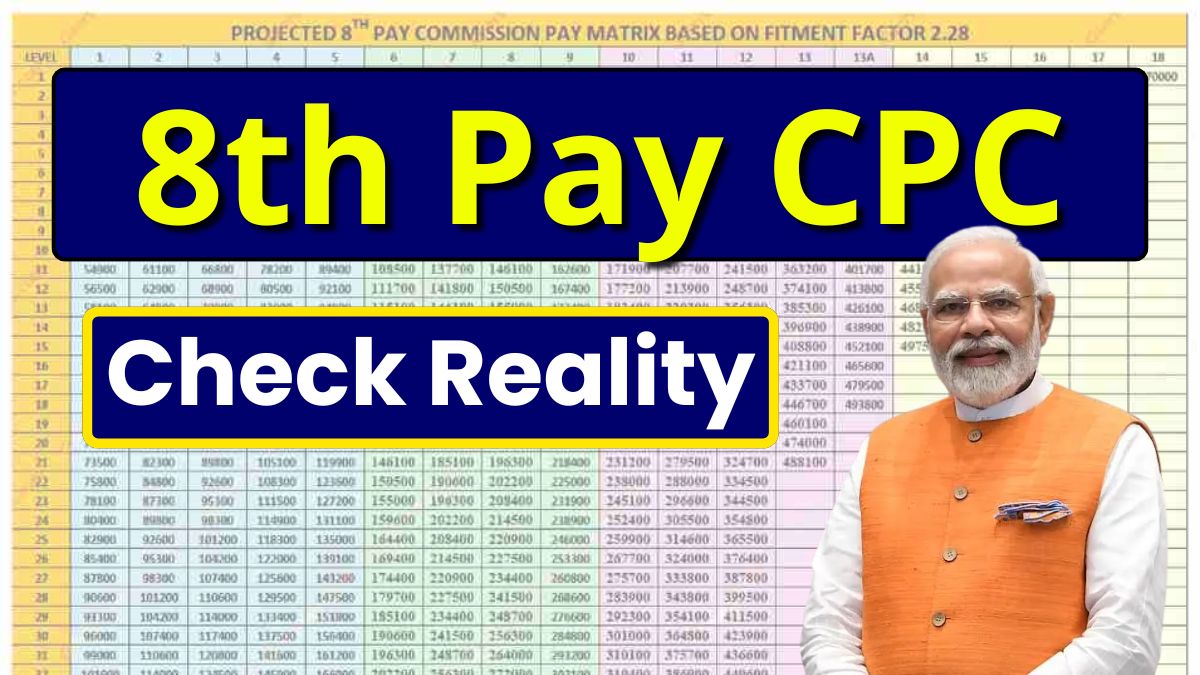If you’re a central government employee or pensioner, you’ve probably been hearing a lot about the upcoming 8th Pay Commission. The big question on everyone’s mind is: When will it come, and how much salary hike can we expect?
Let’s break it down in simple terms — what’s happening, what’s expected, and how it might affect your income in 2025–26.
What Is the 8th Pay Commission All About?
Every 10 years, the Indian government forms a Pay Commission to review the salary structure of its employees. The goal is simple — to make sure that government salaries stay in tune with inflation, living costs, and economic growth.
The 8th Pay Commission will continue that tradition. It’s expected to review everything — from basic pay, grade pay, and allowances to pension revisions. The last revision under the 7th Pay Commission was implemented in 2016, so naturally, the next one is due around 2026.
8th Pay Commission Salary Update (2025)
As of now, there’s no official notification from the central government. But according to several credible reports, the formation of the 8th Pay Commission committee may begin by late 2025, with implementation likely from 1st January 2026.
That’s the usual pattern — the 6th Pay Commission was implemented in 2006, the 7th in 2016, and the next one fits perfectly into that timeline.
Insiders suggest a fitment factor of around 2.86, which means your basic pay could nearly triple. Yes, that’s a huge jump!
What Is the 8th Pay Commission Fitment Factor?
Here’s the thing — the fitment factor is the key multiplier used to calculate your new basic salary.
For example, if your current basic pay is ₹30,000, and the proposed fitment factor is 2.86, your new basic would be roughly ₹85,800.
Check out this example chart below:
| Current Basic Pay | Estimated New Basic Pay (2.86x) |
|---|---|
| ₹18,000 | ₹51,480 |
| ₹25,500 | ₹72,930 |
| ₹35,400 | ₹101,244 |
| ₹44,900 | ₹128,414 |
| ₹56,100 | ₹160,446 |
| ₹67,700 | ₹193,642 |
These are approximate estimates, of course — the final figures will depend on official government notifications.
When Will the 8th Pay Commission Be Implemented?
Although the government hasn’t made a formal announcement, most experts agree that the implementation date will be 1st January 2026. Historically, Pay Commissions in India are rolled out from the beginning of the year following their formation.
So, it’s safe to say that central government employees and pensioners can start preparing financially for a new salary structure in 2026.
How Does the 8th Pay Commission Calculator Work?
The 8th CPC salary calculator is a simple tool that helps you estimate your new salary. Here’s what you’ll need to enter:
- Your current basic pay (as per 7th Pay Commission)
- The expected fitment factor (e.g., 2.86)
- Your pay level or matrix
- Allowances such as HRA, TA, and DA
Once you input these, you’ll get an idea of your revised salary after the 8th Pay Commission recommendations take effect.
8th Pay Commission and DA Reset
The Dearness Allowance (DA) — which helps offset inflation — will be reset to 0% when the 8th Pay Commission is implemented.
Don’t worry, though! This is normal. DA will start fresh and increase twice a year based on AICPI (All India Consumer Price Index) data. Since the new basic pay will be higher, even small DA hikes will translate into significant take-home increases.
Who Will Benefit from the 8th Pay Commission?
The following groups are expected to benefit directly:
- Central Government Employees
- Defence Personnel
- Pensioners and Family Pensioners
- Employees in Railways, Postal Departments, and some PSUs (if adopted)
In short, millions of employees and retirees across India will see better compensation and improved pension benefits.
Expected Improvements in the 8th Pay Commission
Here’s a quick comparison of what’s changing from the 7th to the 8th Pay Commission:
| Component | 7th CPC | 8th CPC (Expected) |
|---|---|---|
| Fitment Factor | 2.57 | 2.86 |
| DA Reset | Yes | Yes |
| Matrix Level | Existing | Revised Higher |
| Allowances | Basic | Enhanced HRA, TA, DA |
| Pension Structure | Standard | Improved for families & ex-servicemen |
Why This Matters
Think about it — the last time the pay structure changed was nearly a decade ago. Since then, the cost of living has shot up, from housing to groceries. The 8th Pay Commission isn’t just about higher pay; it’s about restoring balance and financial security for those who keep the government running every day.
It’s also expected to boost morale and create a ripple effect across the economy as spending power increases.
Frequently Asked Questions
Q1. When will the 8th Pay Commission be implemented?
Most likely from 1st January 2026, following the government’s standard 10-year revision cycle.
Q2. What is the expected fitment factor under the 8th Pay Commission?
Reports suggest a fitment factor of around 2.86, which could lead to a 2.5x–3x increase in basic pay.
Q3. Will pensioners benefit from the 8th Pay Commission?
Yes, pensioners will see a direct rise since pensions are calculated as 50% of the last drawn basic pay, which will increase under the new structure.



